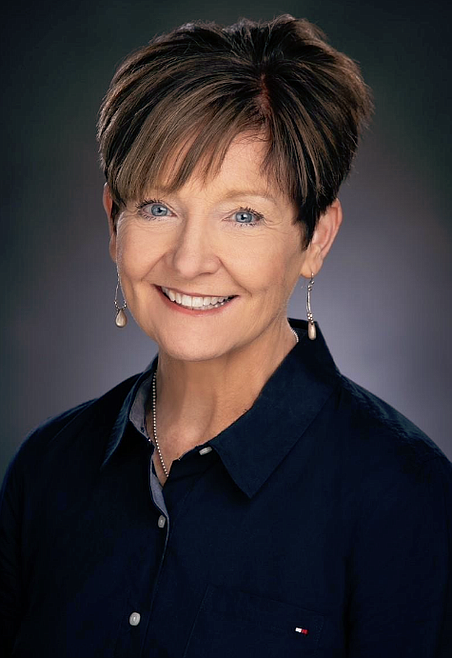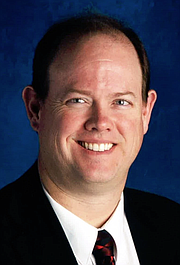Who will be Coeur d'Alene School District's next leader?
COEUR d’ALENE — The two finalists in the search for a new Coeur d’Alene School District superintendent took center stage Thursday evening as they spent one hour each addressing queries about some of the district’s most important topics.
First up was Kate Orozco, assistant superintendent of elementary education and instruction for the Coeur d’Alene School District, followed by Shon Hocker, superintendent of Dickinson Public Schools in Dickinson, N.D.
Each was asked a series of the same 12 questions that covered a range of subjects, including bell schedules, ideas for preparing students for college, the value of school nurses, resources for dyslexic students, how schools will manage North Idaho’s growing population and what is to be done about funding amid the ever-increasing polarization of school levies.
The questions were chosen by the school board and gathered from students, parents, teachers and community members.
In her opening, Orozco made it clear that Coeur d’Alene is her home and students are her priority.
“The most joy I think I’ve ever had is working with children, watching them grow and learn, watching them debate and argue and research and study and get to know one another and support one another,” she said. “I don’t think there’s anything quite like that kind of fulfilling work, and it has been an honor and a privilege to also support colleagues throughout the district who are doing that same important, momentous work, to create strong citizens who have much to offer the world and their families and us as a community.”
Hocker, who has been an educator for 26 years, said youth today are in a unique situation as the jobs of the future that students are preparing for are unknown.
“The beauty of education is being able to try to prepare students for a future that we all don’t know exactly what that’s going to be like,” he said. “That requires some specific dedication.”
Regarding funding, Hocker said “it’s about setting those priorities, it’s about understanding what’s best for students, how can we help students be prepared.”
“There’s so much more to education than just the assessments and things that we might major in in school,” he said. “Students need to be well rounded and involved in community and prepared for college, career, military, all kinds of things.”
He said great relationships with local colleges and universities will help with this matter by providing students dual enrollment opportunities.
“That’s a great way to defer the cost of education,” he said.
Orozco emphasized how important it is to inspire students to be creative in solving problems, locally and globally.
“We want our students to be able to do that,” she said. “That doesn’t start in high school. That starts when they’re in kindergarten.”
Ensuring student voices are heard is also a top priority for Orozco, whose dissertation was on the very subject. She said she’s proud of the work that has already been done with the newly formed Student Advisory Group and its advisers.
“I’ve watched them discuss masking, and I’ve watched them do so with absolutely opposing ideas and I’ve watched them remain civil and kind and compassionate as they describe their disagreements,” she said. “It’s been an incredible experience, and I think student voice is critical.”
Hocker said a passion of his is helping every student be successful.
“As a superintendent in my current district, as well as in my previous district, (I’m) absolutely committed to providing a personalized educational opportunity for every student,” he said. “That personalization includes having voice and choice in their education pathways.”
Regarding the state of funding for public education, Orozco said she feels sometimes that “this is the best of times and the worst of times.”
“We’re struggling so much with our budget across the state,” she said. “It takes a lot of thinking and a lot of careful judicious work together to spend that money well so that all of our kids will benefit.
"It takes summer programs, it takes good Tier 1 and Tier 2 instruction — that’s that work we do in classrooms — to invite students into their own learning and engage their minds well," she continued. "What I’m noticing is that our continued growth of our relationship with our union members is making a big difference. We have the creative problem-solving team that’s a team of union representatives and district representatives. And I believe firmly that we can solve many of our problems there, together.”
Orozco shared a few concerns when asked about population growth. At the elementary level, since the COVID pandemic, Coeur d’Alene has lost about 900 students.
“How do we staff for the fall when we are so unclear right now about our enrollment? We know families are moving in, and we know where they’re moving in, right? Northwest,” she said. "We also know that we’re losing kids. I have a number of principals talking about that. We’re seeing many of our babies go because the families can’t afford rent."
She said they’ve been doing more online enrollment and communicating with families to gauge enrollment numbers.
Housing is also an issue when it comes to retaining teachers.
“I’m nervous about finding housing for teachers,” Orozco said. “I believe it’s a problem we can take on, and that we can find some solutions … If our enrollment grows and we need to hire new teachers, we need to know they’re going to have a place to live.”
Hocker said long-range planning strategies will be necessary to plan for future growth.
“It’s making sure we’re creating environments for our students and our teachers to be successful, and we know when classrooms get to that 30-plus level, it becomes much more challenging,” he said, adding that his district has experienced a 5% growth each year.
“We all have to adjust accordingly,” he said.
When asked about long-term goals, Orozco said she’s committed to Coeur d’Alene.
“I love this community,” she said. “I’m here to stay.”
Hocker said although there are no guarantees, he would like to commit to 10 to 15 years in North Idaho.
The school board on Thursday interviewed Hocker and will interview Orozco today. Deliberations will begin today. The new superintendent may be chosen by early next week if the board is able to schedule a vote with a 24-hour notice.
The next superintendent will replace Superintendent Steve Cook on July 1.
The district invites feedback from the public. Email comments to search21@cdaschools.org by 3 p.m. today to share questions and comments about the superintendent search.



